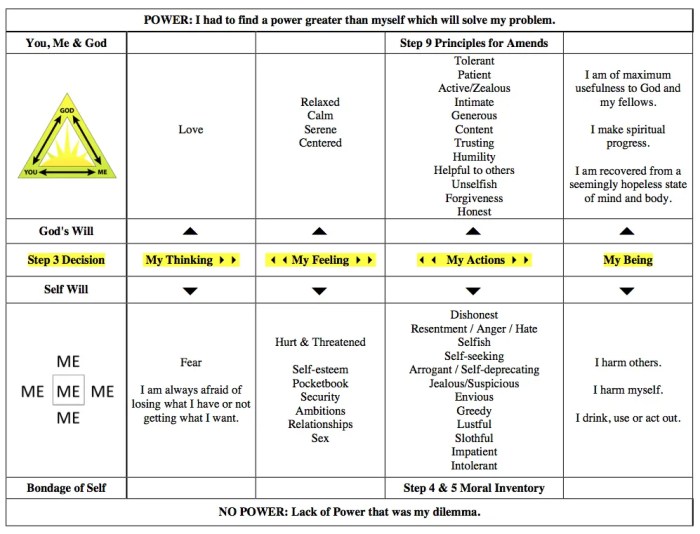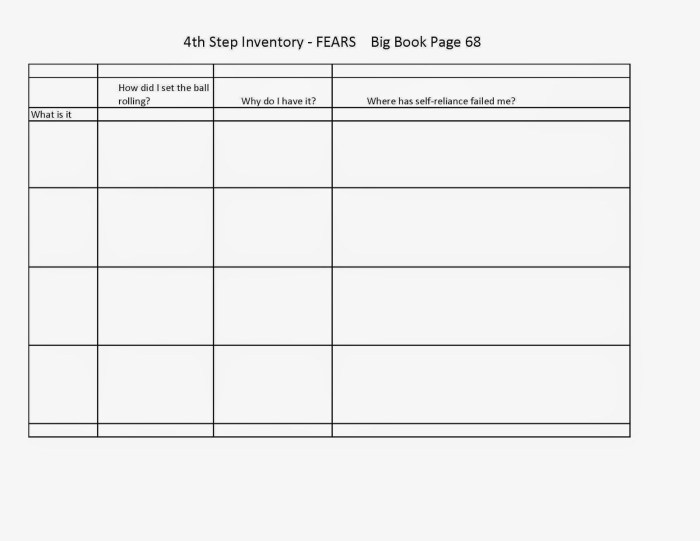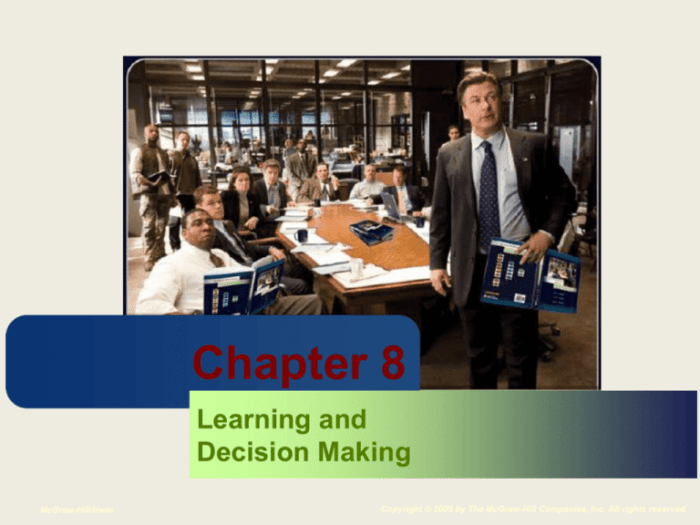Welcome to the chapter 5 AA Big Book summary, where we dive into the heart of the Alcoholics Anonymous program. This chapter serves as a comprehensive guide to the 12 Steps, principles, and practices that have transformed countless lives in recovery.
In this summary, we’ll explore the key themes, principles, and personal experiences that make Chapter 5 a vital resource for anyone seeking recovery from alcoholism.
Overview of Chapter 5
Chapter 5 delves into the essential principles and practices of effective sponsorship. It provides a comprehensive framework for understanding the key elements of sponsorship, including its benefits, types, and strategies for successful implementation. The chapter emphasizes the importance of alignment between the sponsor and the sponsored entity, as well as the need for clear objectives, effective communication, and ongoing evaluation to maximize the impact of sponsorship initiatives.
The chapter is divided into several sub-sections that explore different aspects of sponsorship, including:
Types of Sponsorship
This section Artikels the various types of sponsorship arrangements, including:
- Financial sponsorship
- In-kind sponsorship
- Media sponsorship
- Event sponsorship
Each type of sponsorship offers unique benefits and considerations, and organizations should carefully evaluate their objectives and resources before selecting a sponsorship approach.
Benefits of Sponsorship
This section highlights the potential benefits of sponsorship for both sponsors and sponsored entities, including:
- Increased brand awareness
- Enhanced brand image
- Access to new markets
- Customer loyalty
- Increased sales
Sponsorship can provide a powerful platform for organizations to connect with their target audience and achieve their marketing and business goals.
Strategies for Successful Sponsorship
This section provides practical strategies for developing and implementing effective sponsorship programs, including:
- Defining clear objectives
- Identifying the right sponsorship opportunities
- Negotiating mutually beneficial agreements
- Activating sponsorships to maximize impact
- Evaluating the effectiveness of sponsorship initiatives
By following these strategies, organizations can increase the likelihood of successful sponsorship partnerships that deliver tangible results.
The Role of Sponsorship and the Big Book

In Alcoholics Anonymous (AA), sponsorship and the Big Book play vital roles in supporting individuals in their recovery journey. Sponsors are experienced members who provide guidance, encouragement, and support to those who are new to the program or who are struggling with their sobriety.
The Big Book, also known as “Alcoholics Anonymous,” is a foundational text for AA. It contains the principles and practices of the program, including the 12 Steps and 12 Traditions. The Big Book serves as a guide for recovery, offering insights and practical advice for those who are working to overcome alcoholism.
The Role of Sponsors
Sponsors play a crucial role in AA by providing support and guidance to individuals in recovery. They offer a safe and confidential space for individuals to share their experiences, challenges, and successes. Sponsors can provide emotional support, practical advice, and help individuals navigate the 12 Steps and other aspects of the AA program.
Sponsors are typically experienced members of AA who have been sober for an extended period of time. They have a deep understanding of the program and are able to provide guidance and support based on their own experiences.
The Importance of the Big Book
The Big Book is a fundamental text for AA. It contains the principles and practices of the program, including the 12 Steps and 12 Traditions. The Big Book provides a roadmap for recovery, offering insights and practical advice for those who are working to overcome alcoholism.
The Big Book is not a religious text, but it does contain spiritual principles that are central to the AA program. It emphasizes the importance of honesty, humility, and a willingness to surrender to a higher power. The Big Book also provides guidance on how to build a strong support network and how to live a sober and fulfilling life.
Personal Stories and Experiences
The transformative power of Alcoholics Anonymous (AA) extends beyond statistics and theories. Personal stories and experiences serve as a testament to the profound impact the program has had on individuals struggling with alcohol addiction.
These stories highlight the program’s principles and practices in action, showcasing the journey from despair to recovery. They offer hope and inspiration to those seeking a path to sobriety.
From Darkness to Light
Sarah, a former alcoholic, shares her journey through AA’s 12-step program. After years of struggling with addiction, she found solace and support within the fellowship. Through the guidance of her sponsor and the principles of AA, she overcame her addiction and rebuilt her life.
Sarah’s story exemplifies the transformative power of AA. Her experiences demonstrate the program’s ability to provide a safe and supportive environment where individuals can confront their addiction and embark on the path to recovery.
A Journey of Redemption
Mark, another recovering alcoholic, found redemption through AA. Haunted by past mistakes, he sought guidance from the program. With the support of his sponsor and the fellowship, he learned to make amends, forgive himself, and find peace within.
Mark’s journey highlights the importance of forgiveness and self-acceptance in the recovery process. Through AA, he found the strength to confront his past and emerge as a better person.
Hope Amidst Despair, Chapter 5 aa big book summary
For many individuals, AA provides a beacon of hope amidst the darkness of addiction. Emily, a single mother struggling with alcoholism, found solace and support within the program. Through the shared experiences and understanding of other members, she found the strength to break free from addiction and provide a better life for herself and her children.
Emily’s story underscores the power of community and shared experiences in the recovery process. AA provides a sense of belonging and support, helping individuals to overcome their addiction and rebuild their lives.
Challenges and Obstacles in Recovery

Recovery is a challenging journey that requires dedication, support, and perseverance. Individuals may encounter various obstacles and challenges along the way, but it is essential to remember that these are common and can be overcome.
Chapter 5 of AA’s Big Book delves into the spiritual awakening that comes with recovery. While reading this chapter, I couldn’t help but think of the famous king of france crossword puzzle. Just as solving a crossword requires patience and insight, so too does the journey of spiritual awakening.
And just as the satisfaction of completing a crossword is immense, so too is the reward of finding a higher power and living a life of purpose.
Common challenges faced during recovery include:
- Cravings and triggers
- Relapse
- Emotional dysregulation
- Interpersonal difficulties
- Physical health concerns
To overcome these challenges, individuals should:
- Seek professional help from therapists, counselors, or support groups
- Develop coping mechanisms for cravings and triggers
- Practice mindfulness and self-care
- Build a strong support system
- Maintain a healthy lifestyle
Cravings and Triggers
Cravings and triggers are common obstacles in recovery. Cravings are intense desires for a substance, while triggers are situations or stimuli that can evoke these cravings. To cope with cravings and triggers, individuals can:
- Identify and avoid triggers
- Practice relaxation techniques
- Engage in distraction activities
- Talk to a sponsor or support person
The Importance of Support and Community: Chapter 5 Aa Big Book Summary

In recovery, the presence of a strong support system and a sense of community are crucial for long-term success. Support groups, such as Alcoholics Anonymous (AA), offer individuals a safe and supportive environment where they can connect with others who understand their struggles.
Attending AA meetings provides a platform for sharing experiences, offering encouragement, and holding each other accountable. By interacting with others who are also on the path to recovery, individuals can learn from their successes and setbacks, gain a sense of belonging, and develop a network of people who can support them in their journey.
Benefits of Attending AA Meetings
- Provides a sense of belonging and acceptance:AA meetings create a welcoming environment where individuals can connect with others who share similar experiences, reducing feelings of isolation and shame.
- Offers emotional support:Members can share their challenges and triumphs, providing each other with encouragement, empathy, and a sense of community.
- Promotes accountability:Regular attendance at meetings helps individuals stay accountable to their recovery plan and provides a network of people who can offer support and guidance when needed.
- Encourages self-reflection:By sharing their experiences and listening to others, individuals can gain valuable insights into their own recovery process and identify areas for growth.
- Provides access to resources:AA meetings often connect individuals with other resources, such as treatment centers, support groups, and sponsors, which can further support their recovery journey.
Common Queries
What is the main purpose of Chapter 5 in the AA Big Book?
Chapter 5 provides a detailed overview of the 12 Steps of AA, the principles of the program, and the role of sponsorship and community support in recovery.
How can the 12 Steps help individuals in recovery?
The 12 Steps offer a structured approach to recovery, guiding individuals through a process of self-reflection, amends, and spiritual growth.
What is the role of a sponsor in AA?
A sponsor is an experienced AA member who provides guidance, support, and accountability to individuals in recovery.